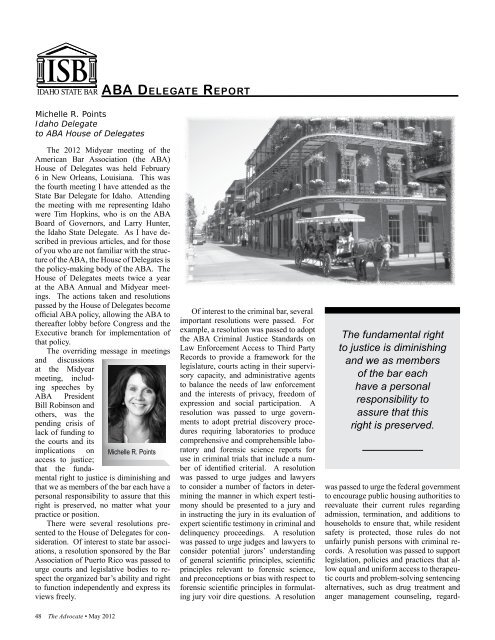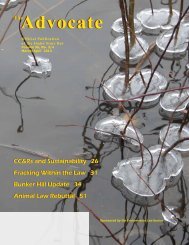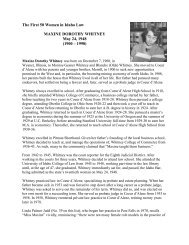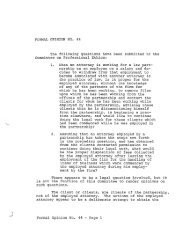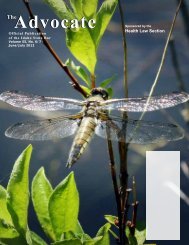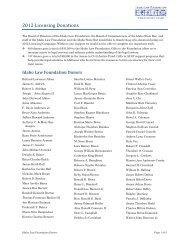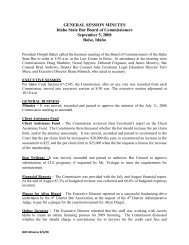The Advocate - May 2012 - Idaho State Bar - Idaho.gov
The Advocate - May 2012 - Idaho State Bar - Idaho.gov
The Advocate - May 2012 - Idaho State Bar - Idaho.gov
Create successful ePaper yourself
Turn your PDF publications into a flip-book with our unique Google optimized e-Paper software.
Michelle R. Points<br />
<strong>Idaho</strong> Delegate<br />
to ABA House of Delegates<br />
48 <strong>The</strong> <strong>Advocate</strong> • <strong>May</strong> <strong>2012</strong><br />
aBa de l e g at e re P o r t<br />
<strong>The</strong> <strong>2012</strong> Midyear meeting of the<br />
American <strong>Bar</strong> Association (the ABA)<br />
House of Delegates was held February<br />
6 in New Orleans, Louisiana. This was<br />
the fourth meeting I have attended as the<br />
<strong>State</strong> <strong>Bar</strong> Delegate for <strong>Idaho</strong>. Attending<br />
the meeting with me representing <strong>Idaho</strong><br />
were Tim Hopkins, who is on the ABA<br />
Board of Governors, and Larry Hunter,<br />
the <strong>Idaho</strong> <strong>State</strong> Delegate. As I have described<br />
in previous articles, and for those<br />
of you who are not familiar with the structure<br />
of the ABA, the House of Delegates is<br />
the policy-making body of the ABA. <strong>The</strong><br />
House of Delegates meets twice a year<br />
at the ABA Annual and Midyear meetings.<br />
<strong>The</strong> actions taken and resolutions<br />
passed by the House of Delegates become<br />
official ABA policy, allowing the ABA to<br />
thereafter lobby before Congress and the<br />
Executive branch for implementation of<br />
that policy.<br />
<strong>The</strong> overriding message in meetings<br />
and discussions<br />
at the Midyear<br />
meeting, including<br />
speeches by<br />
ABA President<br />
Bill Robinson and<br />
others, was the<br />
pending crisis of<br />
lack of funding to<br />
the courts and its<br />
implications on<br />
access to justice;<br />
that the funda-<br />
Michelle R. Points<br />
mental right to justice is diminishing and<br />
that we as members of the bar each have a<br />
personal responsibility to assure that this<br />
right is preserved, no matter what your<br />
practice or position.<br />
<strong>The</strong>re were several resolutions presented<br />
to the House of Delegates for consideration.<br />
Of interest to state bar associations,<br />
a resolution sponsored by the <strong>Bar</strong><br />
Association of Puerto Rico was passed to<br />
urge courts and legislative bodies to respect<br />
the organized bar’s ability and right<br />
to function independently and express its<br />
views freely.<br />
Of interest to the criminal bar, several<br />
important resolutions were passed. For<br />
example, a resolution was passed to adopt<br />
the ABA Criminal Justice Standards on<br />
Law Enforcement Access to Third Party<br />
Records to provide a framework for the<br />
legislature, courts acting in their supervisory<br />
capacity, and administrative agents<br />
to balance the needs of law enforcement<br />
and the interests of privacy, freedom of<br />
expression and social participation. A<br />
resolution was passed to urge <strong>gov</strong>ernments<br />
to adopt pretrial discovery procedures<br />
requiring laboratories to produce<br />
comprehensive and comprehensible laboratory<br />
and forensic science reports for<br />
use in criminal trials that include a number<br />
of identified criterial. A resolution<br />
was passed to urge judges and lawyers<br />
to consider a number of factors in determining<br />
the manner in which expert testimony<br />
should be presented to a jury and<br />
in instructing the jury in its evaluation of<br />
expert scientific testimony in criminal and<br />
delinquency proceedings. A resolution<br />
was passed to urge judges and lawyers to<br />
consider potential jurors’ understanding<br />
of general scientific principles, scientific<br />
principles relevant to forensic science,<br />
and preconceptions or bias with respect to<br />
forensic scientific principles in formulating<br />
jury voir dire questions. A resolution<br />
<strong>The</strong> fundamental right<br />
to justice is diminishing<br />
and we as members<br />
of the bar each<br />
have a personal<br />
responsibility to<br />
assure that this<br />
right is preserved.<br />
was passed to urge the federal <strong>gov</strong>ernment<br />
to encourage public housing authorities to<br />
reevaluate their current rules regarding<br />
admission, termination, and additions to<br />
households to ensure that, while resident<br />
safety is protected, those rules do not<br />
unfairly punish persons with criminal records.<br />
A resolution was passed to support<br />
legislation, policies and practices that allow<br />
equal and uniform access to therapeutic<br />
courts and problem-solving sentencing<br />
alternatives, such as drug treatment and<br />
anger management counseling, regard-


